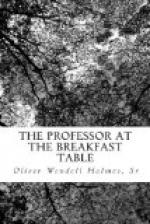The old Latin tutor put a modest blue stone at the head of his late companion, with her name and age and Eheu! upon it,—a smaller one at her feet, with initials; and left her by herself, to be rained and snowed on,—which is a hard thing to do for those whom we have cherished tenderly.
About the time that the lichens, falling on the stone, like drops of water, had spread into fair, round rosettes, the tutor had starved into a slight cough. Then he began to draw the buckle of his black trousers a little tighter, and took in another reef in his never-ample waistcoat. His temples got a little hollow, and the contrasts of color in his cheeks more vivid than of old. After a while his walks fatigued him, and he was tired, and breathed hard after going up a flight or two of stairs. Then came on other marks of inward trouble and general waste, which he spoke of to his physician as peculiar, and doubtless owing to accidental causes; to all which the doctor listened with deference, as if it had not been the old story that one in five or six of mankind in temperate climates tells, or has told for him, as if it were something new. As the doctor went out, he said to himself,—“On the rail at last. Accommodation train. A good many stops, but will get to the station by and by.” So the doctor wrote a recipe with the astrological sign of Jupiter before it, (just as your own physician does, inestimable reader, as you will see, if you look at his next prescription,) and departed, saying he would look in occasionally. After this, the Latin tutor began the usual course of “getting better,” until he got so much better that his face was very sharp, and when he smiled, three crescent lines showed at each side of his lips, and when he spoke; it was in a muffled whisper, and the white of his eye glistened as pearly as the purest porcelain, —so much better, that he hoped—by spring—he—might be able--to--attend------to his class again.--But he was recommended not to expose himself, and so kept his chamber, and occasionally, not having anything to do, his bed. The unmarried sister with whom he lived took care of him; and the child, now old enough to be manageable and even useful in trifling offices, sat in the chamber, or played, about.
Things could not go on so forever, of course. One morning his face was sunken and his hands were very, very cold. He was “better,” he whispered, but sadly and faintly. After a while he grew restless and seemed a little wandering. His mind ran on his classics, and fell back on the Latin grammar.
“Iris!” he said,—“filiola mea!”—The child knew this meant my dear little daughter as well as if it had been English.—“Rainbow!” for he would translate her name at times,—“come to me,—veni”—and his lips went on automatically, and murmured, “vel venito!”—The child came and sat by his bedside and took his hand, which she could not warm, but which shot its rays of cold all through her slender frame. But there




